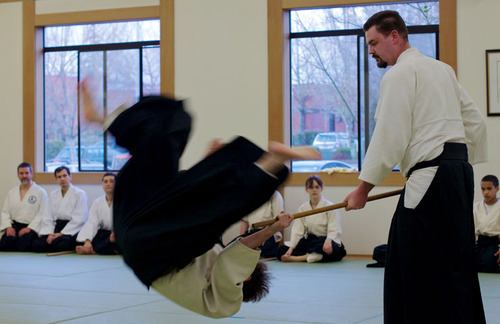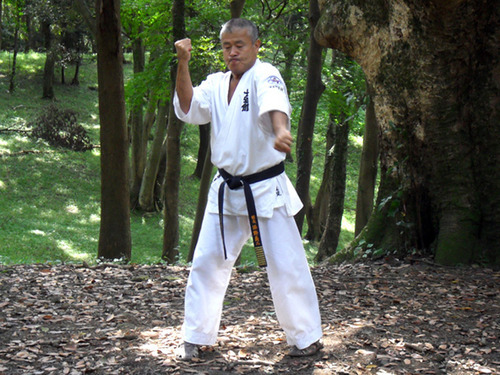Ki is the internal energy present in all of us. It allows a person to do things not normally possible utilizing muscle power, and makes Aikido possible. There are four parts to Ki.
Ki is at its greatest in a relaxed state. When you try to do something utilizing muscle power, in most cases you actually call upon two sets of muscles, one set to extend and another set to contract. You are literally working against yourself. You do not encounter this problem if you relax.
Your one point, or Hara, is your center of gravity and much more. By maintaining it, you need to not only maintain your balance, but do not let it be drawn a way by an opponent.
The lower you are the better. Lowering of the one point and maintaining it go hand in hand. You also want to avoid being top heavy, as it makes it easier to be thrown if you are top heavy.
Ki has no effect if it is not extended. This is both a physical and a mental action. Physically, it is the act of following through. Like a pitcher throwing a baseball, if he follows through on the pitch, it travels farther and faster than if he didn’t. Mentally, it is the point of focus. Do not throw your opponent to the ground, think about throwing them through the ground and a mile into the earth.
Ki does not flow easily through improper technique, and proper technique can only be learned through practice with a cooperative partner. When you work with a partner on a technique, begin by not resisting the technique. Allow it to happen. This will give your partner a feel for the technique and allow them to develop proper technique. Also, resistance can lead to injury. Many of the technique will work easily against a resisting opponent, but the tension present in a resisting opponent limits their ability to move with a technique, increasing the risk of injury. It is best not to apply any resistance unless you and your partner are thoroughly familiar with the technique and methods of moving with the technique.

It is also the responsibility of the Nage (“Thrower”, the person executing a technique) to exercise control. Aikido and Ki can be very powerful, or very gentle, depending on how you want to use it. In class, we strive to improve ourselves and increase our knowledge; we do not want to injure each other. So we want to exercise control. Do not become frustrated if you are having difficult and never execute a technique or throw with full power against another student. Instead, remain calm and relaxed, and execute the technique with just enough force for it to work on your partner.

